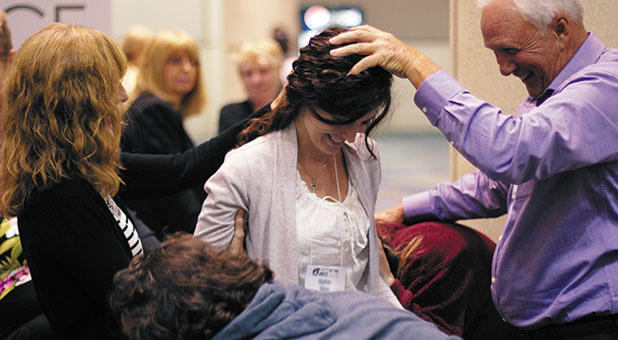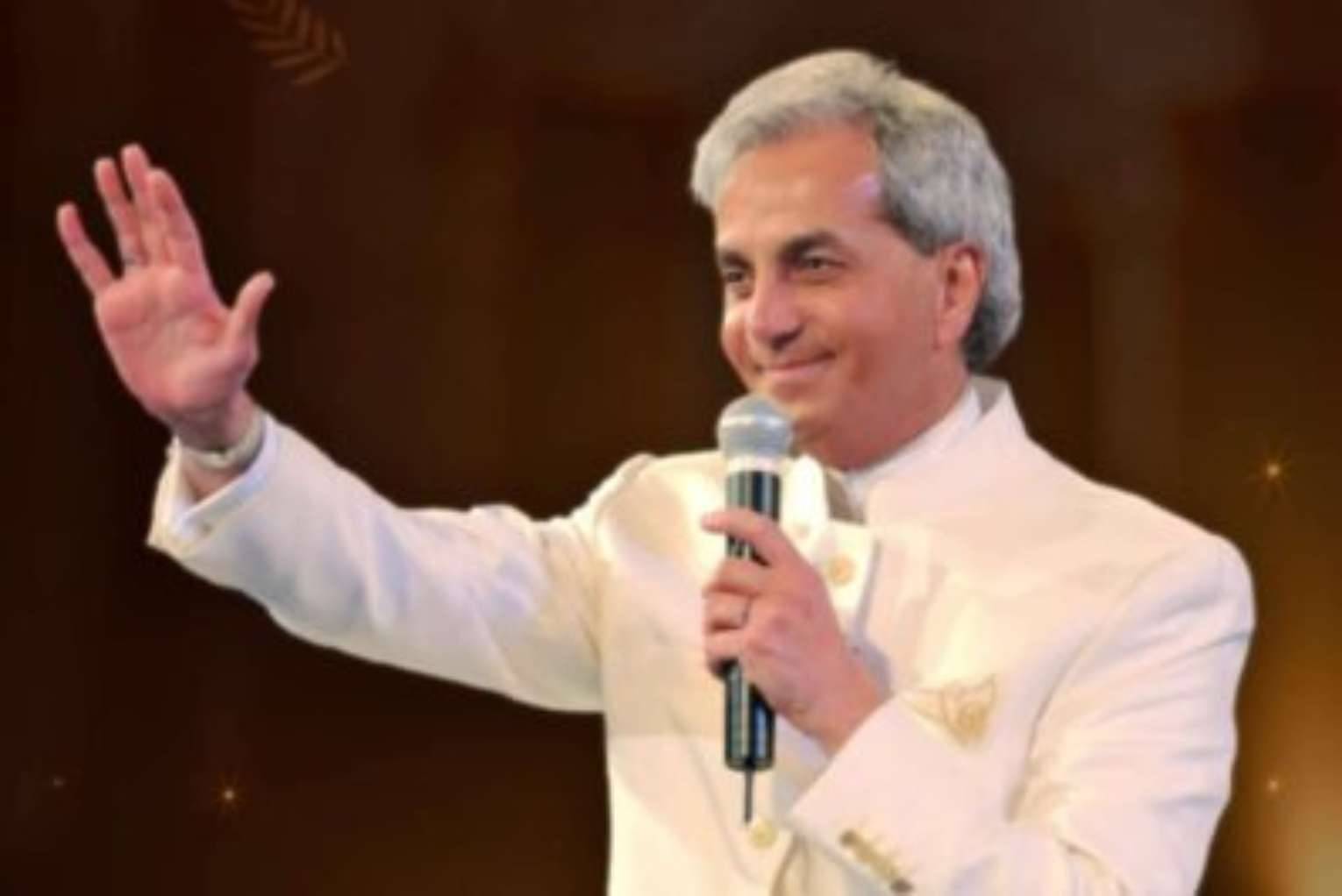When Kevin Dedmon walked into a New Mexico pizza shop with two 60-year-old women and a young man, the hostess told the visitors to sit anywhere they liked.
“We’re not here for pizza,” replied the pastor from Northern California’s Bethel Church. “We’re on a treasure hunt.”
After they showed her clues the Holy Spirit had revealed prior to the group’s visit, the woman said, “I’m not a treasure. I’m an atheist.” Then she asked them to leave. As they turned to go, Dedmon sensed the Spirit leading him to tell the woman, “God wants you to know you’re a good mom.”
Immediately, she erupted with cries so loud the shop’s owner rushed out from the back to halt what he thought was a robbery in progress. “No,” the woman told him, “they’re here to help me.”
Then she related how her 16-year-old daughter had tried to commit suicide four days earlier. That morning, the hostess awakened awash with guilt, thinking her poor parenting skills were to blame.
Not only did the hostess accept Christ and get filled with the Spirit, so did the owner. Amazing? Yes, but for Dedmon and others he has trained, such continuing experiences illustrate the effectiveness of prophetic evangelism—an innovative method of reaching unbelievers through prophetic gifts.
Today, Christian evangelists and laypersons alike are using words of wisdom, gifts of healing and prophecy to open others’ hearts and minds to the claims of Christ. These modern-day soul winners say these supernatural insights mean the best days of evangelism are still ahead.
“This is the antithesis of the normal preacher with a bullhorn condemning (crowds): ‘You rotten sinners,’ ” says Dedmon, whose book, Treasure Hunt, has become a classic in this field. “I think it’s time the world gets a true representation of Jesus. He didn’t go around condemning sinners and tax collectors, just religious leaders. He became a doctor, a friend and a counselor to people, and they wanted to follow Him.”
“It’s just an expression of how we do life,” says Bethel Pastor Bill Johnson, whom Dedmon credits with opening him to the “out-of-the-box” thinking that led to Treasure Hunt. “All prophetic evangelism is connecting to God’s heart for people. Jesus came to reveal the Father, not the taskmaster or the caretaker of an orphanage. We look to find the gold in people, for what God has deposited in them. That’s their true identity.”
Prophetic evangelism is definitely on an upward trend, comments Hal Linhardt, director of the Forerunner Evangelism department at the International House of Prayer in Kansas City, Missouri. Ironically, despite its reputation as a cutting-edge ministry for more than 15 years, IHOPKC’s evangelistic outreach has only blossomed during the past five.
While Dedmon’s book helped light a spark, Linhardt identifies a crucial development as his team attended Christ for all Nations Founder Reinhard Bonnke’s first school of evangelism in Orlando, Florida, in June 2012.
“He laid hands on everyone,” Linhardt says. “We came back with a fresh anointing and a zeal to go out and do things, whether prophesying to people, healing or calling people out into their destiny. I think it’s part of the restoration of all things. With the establishment of the 24-7 prayer movement, I think God is answering prayers. He saves the best wine for last.”
This emphasis is emerging through various leaders. Figures like former drug addict Todd White (founder of Power & Love Ministries), Steven Uggen of Trinity Works in Minneapolis, and prophetic teacher Randy Clark. A number of powerful evangelists are part of Clark’s ministry, such as Will Hart, featured in filmmaker Darren Wilson’s latest movie, Holy Ghost.
This movement is widespread too.
Dallas-area teacher Jean Krisle Blasi, who has taught at Bethel and numerous other venues, knows of churches in California, Michigan and Hawaii that are especially active, as well as one in Germany.
Blasi says that while every believer has the gift of prophecy in them, many don’t recognize it. Insisting that everyone with Jesus inside has a prophetic gift, she trains thousands of people annually on how to listen so it can emerge.
“It’s a new paradigm,” Blasi says. “It comes out of the presence and power of God. You’ve got to have the presence of God; He has to do the work. It’s not you. When I open my mouth because I believe God is going to be there, God comes.”
Reaching the Lost
This expanding form of outreach promises to multiply the often-limited impact of traditional evangelism.
A 2013 survey by The Barna Group found that 73 percent of born-again Christians say they have a personal responsibility to share their faith, but only 52 percent had actually done so during the previous year.
Fear and uncertainty over how to present the gospel to unbelievers are often cited as prime drawbacks. But Dedmon thinks the very nature of street witnessing that reaches drug addicts and the homeless proves ineffective with doctors, lawyers, soccer moms or delivery truck drivers.
Formerly a pastor in Huntington Beach, California, Dedmon saw this firsthand going to the beach every Friday night for 10 years. He says prophetic evangelism not only meets needs, it unlocks others’ destinies.
Healing is an integral part of this tool. Two years ago in a shopping mall in Switzerland, Dedmon observed a Muslim family, denoted by the women clad in burkas. He walked up and asked who had back pain, which brought an affirmative response from an elderly woman.
Assuring her he could practice “presence therapy,” Dedmon placed his hand on her back and prayed. About 15 seconds later, she gyrated with joy before placing his hand on her neck and asking him to pray for her neck and shoulders.
Next, he prayed for the woman’s 12-year-old granddaughter, who hadn’t been able to bend over normally. The girl responded by jumping in the air, exclaiming, “Grandma, I’m healed!” Before Dedmon left, everyone had said a prayer indicating their decision to follow Christ.
Johnson says Bethel has observed more than 1,000 healings in the midst of this wave, such as one woman who had steel rods in her spine that vanished, people coming out of wheelchairs, and cancer cures.
“We don’t do what we do to get attention,” the pastor says of skeptics who question such reports. “If the person who was deaf in his right ear can hear now, he knows.”
IHOPKC has reported similar activity. Linhardt says his teams have seen around 1,000 healings the past year during weekly visits to Kansas City’s jails, nursing homes, festivals, and other places. About 90 percent occur outside of church environments.
“We go anywhere people are,” Linhardt says. “Sometimes we’re led to a particular person. It’s all about talking to people and the Holy Spirit letting us know something about them.”
They happen outside the state too. Last year Ehi Taranov traveled to New Orleans with an IHOPKC evangelism team. There he approached a young man who had just exited a bar and asked if he had pain in his lower back.
“Actually I do,” the man responded. “I just drank beer and that’s why, because I’m in excruciating pain and I don’t like the pills they gave me.” Taranov asked if he could put his hand on the man’s vertebrae. When he agreed, Taranov simply prayed, “In Jesus’ name, be healed.” The man responded by bending over and touching his toes. Then he screamed, exclaiming he hadn’t been able to do that for five years. He asked how Taranov had been able to do that. “Jesus,” Ehi replied. “Would you like to know more?” “Yes,” the man said, and said a prayer dedicating his life to Christ.
Treasure Hunting
Dedmon first thought of treasure hunting in 2003. Despite Bethel’s burgeoning reputation as a spiritual mecca—its School of Supernatural Ministry has 2,100 students—back then few members were going on visitations. Even the leader didn’t want to go; when he confessed that, God told him, “So change it.”
That led to the concept of developing a treasure map with certain clues from the Spirit about people who represent treasures. Namely, those whom God has His eye on because He knows who is spiritually receptive. One suggested approach: “Excuse me, ma’am. We’re on a treasure hunt and we think you are our treasure. See, we have red shirt on our list and you have a red shirt on. We are out to bless people in the community, and we want to see if you need healing anywhere in your body.”
“I’ve made witnessing and evangelism fun,” Dedmon says. “The evangelist’s job is to equip, activate and empower people to do witnessing. We’re all supposed to witness. I don’t even like the term, ‘prophetic evangelism,’ because it makes it seem like the evangelist is supposed to be doing the witnessing.”
While their methods aren’t identical, the Kansas City evangelists see similar results. When Josh MacDonald flew to a conference Minneapolis in the spring of 2014, he and another team member noticed a blonde teen a few rows away because of her repeated glances at them during their flight.
As the married 25-year-old MacDonald wondered if she was flirting, the Spirit whispered, “She’s an evangelist.”
Unable to find her after they landed, MacDonald pulled out his phone and recorded a video declaring the girl was an evangelist. He promised to show her the video later that weekend.
As the weekend passed, MacDonald wondered if he had heard right. That is, until he saw her with her parents as they arrived at the airport for their return flight.
Walking up, MacDonald introduced himself and showed them the video he recorded two days earlier. After all three burst into tears, MacDonald encouraged her to pursue God’s calling.
“I just accepted Jesus into my life a month ago,” said the girl, who was staying at a Kansas City boarding school after earlier rebellions left her parents unable to cope.
This meeting led to a relationship between the boarding school and IHOPKC, and financial support for MacDonald’s ministry (Messenger’s BootCamp) from the parents. It also prompted a visit to the IHOPKC campus by the girl and her mother in early January of 2015. With her daughter in constant pain because of a rare disease that led to her shoulders constantly popping out of place, the mother had driven to Kansas City to comfort her.
The morning MacDonald prayed for her, he recalls the Spirit falling over the room and both of the girl’s shoulder blades snapping into place. “She lifts her arms straight up in the air and her mother is crying and saying, ‘I can’t believe it,’ ” MacDonald says.
Facing Challenges
As exciting as such testimonies are, believers must steel themselves for rejection like the kind IHOPKC’s assistant evangelist department director, Laurie Ditto, encountered several years ago.
She took a team of international students on door-to-door evangelism, something they would never do at home. At one house, an elderly African-American answered. As an Hispanic girl with heavily-accented English explained why they were there, Ditto heard the Spirit say, “He’s going to die in three days.”
Although the man replied that he wasn’t interested, Ditto followed by describing the terrible things that had happened during his life, including rejection by his children. Telling him she had come because of his sickness, Ditto asked if he had cancer. He asked how she knew, but when she said, “Jesus,” he rejected her invitation to follow Him.
“So I started all over again and God gave him more wonderful facts about this man,” Ditto recalls. “He eventually said, ‘I believe you believe what you’re telling me, but I refuse to believe there’s a God. Now please leave.’ ”
“I wanted to quit my job,” says Ditto, the author of Go Tell Others About Me. “I told Hal, ‘I quit’ and he said, ‘You don’t need to quit. You need a vacation.’ ”
Soon after, Ditto and her husband received two plane tickets to Florida, where a family provided them a place to stay, a car, and spending money. One day as she sat by the pool and asked God what to do, He replied she could quit but there wouldn’t be anyone to take her place—a divine comment on the lack of workers in the spiritual harvest.
Ditto has since seen the wisdom of remaining. At last December’s One Thing conference, she met a young teen and his grandparents. As she talked to them, she sensed the young man was quite troubled.
Using her prophetic gift, she described his nature and his favorite subject in school. That led to a discussion where she learned that the youth had tried to commit suicide and was considering another attempt. She later told the grandparents that the boy didn’t trust them because of some things that had happened in the past, which prompted a teary admission from the grandmother that she had spoken uncaring words.
“This grandfather was a 6-foot-6, 250-pound man and he told this teen, ‘I affirm you,'” Ditto says. “When I saw them the next day, everything about this boy had changed. Yes, he got saved, but this prophetic gift is able to unlock pieces of people’s heart.”
Besides potential rejection, Christians must keep a balanced perspective about what lies ahead. Linhardt warns that the last days will include great darkness, “technological tyranny,” and God’s judgment.
Before the latter occurs, he thinks God’s mercy will be evident as prophetic evangelism leads to mass conversions.
“In judgment God is going to remember mercy, which means souls, which means He needs evangelists,” Linhardt says. “He’s literally giving the call of the evangelist to the church. That’s prophetic. Judgment is coming and He needs workers.”
As part of this divine activity, the IHOPKC leader predicts there will be round-the-clock evangelism, similar to the 24-7 prayer movement that has spread across the globe since 1999.
He believes that helping fuel this development will be formation of countless grassroots evangelists’ groups, which Linhardt says will provide the accountability and mutual encouragement they often can’t find in churches.
Johnson agrees that God is at work in powerful ways. Instead of fretting over the huge social problems in our midst, he advises Christians to take their cue from Christ. When John the Baptist asked if He was “the One,” Jesus told him to focus on results: the lame walking, the blinding see, the deaf hearing and the gospel proclaimed (Matt. 11:5).
“There are things happening now that were dreams a decade ago,” Johnson says. “Miracles are common. I can’t give the details, but we’re frequently brought to offices of national political leaders and top business leaders. There’s a level of (spiritual) hunger at the higher echelons of society I have never seen.”
Lindhardt gets this too. “I think we’re going to see some of the most exciting evangelism ever take place in the very near future,” Lindhardt says.
Ken Walker is a freelance writer, co-author, and book editor from Huntington, West Virginia, as well as a longtime contributor to Charisma.
Evangelist Tom Scarrella shares ideas on how to go out and impact the harvest through the Spirit at propheticevangelism.charismamag.com.












































